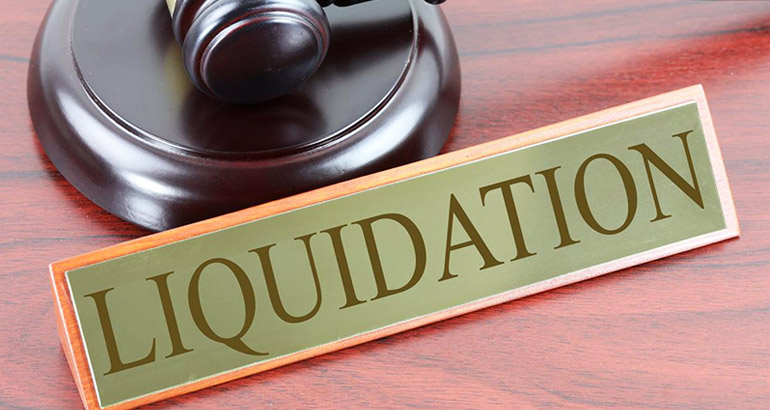The Ultimate Guide To Company Liquidation
The Ultimate Guide To Company Liquidation
Blog Article
The Main Principles Of Company Liquidation
Table of ContentsLittle Known Questions About Company Liquidation.The Single Strategy To Use For Company LiquidationCompany Liquidation Things To Know Before You BuyCompany Liquidation Things To Know Before You BuyThe Single Strategy To Use For Company Liquidation
A liquidator is specifically designated to look after the winding up of a company's affairs in order for it to be shut down generally when the company is declaring bankruptcy. The liquidator is an impartial 3rd party that supervises the sale of business properties in order to repay any kind of outstanding debts.Their duty consists of, however is not restricted to: Objective Overseer: A liquidator is entrusted with working as an impartial 3rd celebration to manage the entire company liquidation procedure. Develop Statement of Matters: Liquidators have to create a comprehensive declaration of events document. This record is dispersed to lenders, outlining the existing economic standing of business at the time of its liquidation.
After the liquidation of a business, its existence is erased from Firms Home and it stops to be a lawful entity. If directors navigated the process without issue, there would certainly be no charges or personal responsibility for solid debts expected. Currently, with a tidy slate, directors can discover new organization opportunities, though expert appointment is a good idea.
The Basic Principles Of Company Liquidation
As an example, if even more than 90% of all company investors concur, liquidation can take place on brief notification within 7 days, the minimum statutory notification for creditors. However, normally, the larger the liquidation and the more assets and funding business has, the longer the procedure will take. 'Do I have to pay to liquidate my business?', the solution will rely on whether or not your business has any assets leftover when selling off.
:max_bytes(150000):strip_icc()/Liquidation-4193561-Final-699e67d885c243c39cac2985b16d51cb.jpg)
We recognize that no 2 firms coincide, which is why we will certainly put in the time to learn more about your organization so we can advise the very best training course of action for you. We only work in your best passions, so you can be entirely certain in the solution we supply.
Company Liquidation Can Be Fun For Anyone
In the UK, there is an established process to shutting down or restructuring a limited firm, whether it is solvent or bankrupt. This procedure is recognized as liquidation and can only be taken care of by a certified bankruptcy expert (IP) based on the Bankruptcy Act 1986. There are four primary types of business liquidation procedure: Lenders' Voluntary Liquidation (CVL); Obligatory liquidation; Administration; and Participants' Voluntary Liquidation (MVL).

In these conditions, it is very important that the company discontinues trading; if the service continues to trade, the supervisors could be held directly responsible and it could cause the insolvency expert reporting wrongful trading, called misfeasance, which might bring about lawful action. The supervisors designate an insolvency practitioner and as soon as this has been concurred and verified, there is a meeting with the shareholders.
Certainly, if there are no investors, this step of the procedure is not necessary (Company Liquidation). The IP takes control of the company and starts the firm liquidation procedure. The supervisors are no longer included in what occurs, consisting of the sale of the business's possessions. If the directors want any of the possessions, they can inform anonymous the IP.
Our Company Liquidation Ideas
The primary distinction is that the firm's financial institutions applied to the court for an ending up order which compels the bankrupt company into a liquidation procedure. In many situations, lenders take this action as a last resort since they haven't gotten settlement through various other types of settlement. The court designates a bankruptcy expert, also understood as a main receiver, to carry out the required visit homepage business liquidation process.
This type of firm liquidation is not volunteer and directors' conduct is reported to the UK's Secretary of State once the liquidation procedure has been finished. Therefore, any supervisor that falls short to cooperate with the IP or has actually been associated with supervisor misconduct, or a deceptive act, may cause significant effects (Company Liquidation).
It is used as a means to secure the firm from any type of legal activity by its financial institutions. The supervisors of the company accept make normal repayments to resolve their financial debts over an amount of time. The designated manager manages the voluntary administration process, and obtains the settlements which they after that distribute to creditors according to the concurred amounts.
Company Liquidation for Beginners
This gives the firm with time to create a strategy moving forward to save the firm and prevent liquidation. Nevertheless, at this moment, directors hand control of the firm over to the try these out appointed administrator. If a business is solvent however the directors and shareholders intend to shut the service, a Members Voluntary Liquidation is the right choice.
The firm liquidation procedure is managed by a liquidator appointed by the supervisors and investors of the company and they should authorize an affirmation that there are no lenders remaining. The liquidation procedure for an MVL resembles that of a CVL because possessions are understood yet the earnings are distributed to the supervisors and the shareholders of the firm after the liquidator's fees have actually been paid.
Report this page